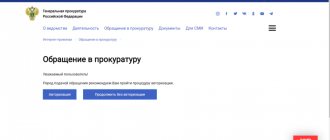The Prosecutor's Office of the Russian Federation is an important body of the country, necessary for maintaining law and order. Based on its powers, it considers applications from citizens. Every citizen has the right to appeal to protect their rights and interests. However, when drawing up an appeal, a number of requirements must be met. The article talks about how to correctly draw up a statement and whether the prosecutor's office considers anonymous appeals from citizens.
Hotline for citizen consultations: 8 (800) 200-46-92
Appeals considered by the prosecutor's office
The Law “On the Prosecutor's Office of the Russian Federation” states that the prosecutor's office, in accordance with their powers, resolves statements, complaints and other requests containing information about violations of laws. An anonymous complaint to the prosecutor's office must contain signs of a serious crime; if they do not, then it is redirected to other organizations to consider them on their merits. So, an example would be redirecting a message to the Labor Inspectorate containing information about wrongful dismissal.
Complaints to the prosecutor's office are more popular among the population than to the court. This is due to the fact that court applications take a significant amount of time, are cumbersome, and costly (payment of state fees). The prosecutor's office must, according to the deadlines established by law, consider them and provide a response. If it is left without consideration, therefore, the organization is obliged to give a reasoned response about the refusal to consider on the merits.
What is considered anonymous?
An anonymous statement, complaint, request, etc. An appeal is considered to be one in which its author is not indicated .
Moreover, if the appeal contains at least some information that makes it possible to find out its author, then it is no longer considered anonymous: for example, a citizen indicated his full name. and email, but forgot to indicate the address and phone number
And in the next chapter we will debunk the widespread stereotype that anonymous applications to the prosecutor’s office are not considered at all. Stay with us!
Anonymous complaint
Based on the Law “On the Procedure for Considering Citizens’ Appeals,” the document must contain certain information. This includes:
- Personal data;
- the address where he wishes to receive a response;
- the essence of the complaint;
- date of compilation and personal signature.
An anonymous complaint is an application that does not contain last name, first name, patronymic, residence, or personal signature among its details. Attitudes towards them have always been ambiguous over time. However, at the moment, a certain procedure for their consideration has been developed. There are many reasons for filing just such complaints, but the most common are fear or the desire to secretly annoy the offender.
Such complaints are not accepted for examination, and a response to them is not sent to the defendant, but there are exceptions. Thus, on the basis of the Law, if the specified appeal contains information about an illegal act being prepared, being committed or committed, as well as about the person preparing, committing or committing it, the appeal must be sent to a state body in accordance with its competence. Therefore, based on the law, a person has the opportunity to file an anonymous complaint with the prosecutor’s office if he provides higher-level information.
Where exactly and how to file a complaint
You can submit a complaint to the prosecutor's office in the following ways:
- Deliver in person. In this case, the citizen submits the complaint to the office employee. He records the data in a special journal and puts a mark of receipt on the employee’s copy. The complaint is then submitted for consideration.
- Get help from a representative. Using a notarized power of attorney, the representative transfers documents to the prosecutor's office in a similar way.
- By mail. In this case, the documents must be sent by registered mail with a description of the contents and a receipt. The notification will confirm receipt of the complaint. This method slows down the time it takes to resolve the issue, since the letter may get lost when sent.
- Electronically. This is done through the Internet reception or government services website. You will need to fill out special fields. In response, you will receive a notification that your request has been received.
A complaint must be filed with the prosecutor’s office in which the citizen’s area of residence belongs. When submitting in person, you must have identification documents with you.
Attention! After the prosecutor's office has carried out its work (collecting information, checking), the citizen must receive an answer (according to Article 10 and Article 27 of Law No. 2202-1). If the complaint is submitted anonymously, then a notification will not be sent for obvious reasons.
Based on the results of the inspection, the employer may be required to correct violations within a specified time frame. If this does not happen, then administrative liability may be imposed on him.
How to correctly handle an anonymous request
As already described, without contact details or information about the applicant, applications are considered anonymous. According to the law, they are left without consideration. However, if they contain socially significant information about a crime, then they will pay attention. These include the following:
- information about the crime committed;
- information about the person/persons who committed the crime;
- about corruption;
- terrorist information;
- violations by the employer.
Even if this information is not available, the prosecutor's office may, at its discretion, verify the report. After all, there is no direct prohibition on consideration; there is a right not to give an answer to the applicant, since this is impossible. This property distinguishes this organization from others, which, most likely, would leave it without consideration.
Regarding the issue raised by the last paragraph, it is better to immediately contact the Labor Inspectorate. They launched a special electronic service: onlineinspection.rf, where an employee can contact. Which is a convenient, easy way to protect your violated rights. However, it is necessary to register through “State Services”, but this is precisely the moment that allows you to calculate your personal data.
In this situation, as well as any other complaints where the citizen wants to remain undisclosed, it is enough to add the phrase: “Please do not disclose information about me as the applicant.”
The Law “On the Procedure for Considering Appeals from Citizens of the Russian Federation” is on the side of the applicant, namely, it does not allow the disclosure of information without the consent of the applicant. However, this is only possible when the information does not concern the applicant personally. After all, it is impossible to conduct a check on a person’s attitude without providing information about him. Everything becomes clear and so.
Methods of delivery to the prosecutor's office
To ensure that your appeal falls into the right hands, you can use one of several methods. It can be delivered:
- by mail;
- through the Internet;
- personally;
- through a trusted person.
Usually the most common method is a personal visit and delivery of the document, but in this case, since the complaint is anonymous, delivery through third parties or the Internet is more common. Let's take a closer look at each of these four options.
By mail
You have to resort to the help of the postal service either due to the distance of your place of residence from the prosecutor’s office to which the request is sent, or to maintain anonymity. But this method has disadvantages: as for anonymity, it is only partially ensured, because at least where the message was sent from is known, but the main thing is not this, but the duration of delivery in this way.
You will have to wait a long time until the letter is received at all, and after that you will not be sent any evidence that the request has been accepted for consideration. A much more effective way is now to apply online.
Through the Internet
Such an application is submitted on the official website of the Prosecutor General's Office of the Russian Federation. Before submitting it, read the filling rules. It should be noted that you still have to indicate your full name and address, without them it will not be accepted, you can only make a note about anonymity.
Personally
Of course, you can resort to this form of transferring the complaint to the prosecutor, but it significantly reduces the degree of anonymity. Otherwise, there are no differences from the usual procedure.
Text structure of an anonymous appeal
An anonymous letter to the prosecutor's office should be as informative and brief as possible. The use of profanity is not permitted. The duration of consideration of this complaint is equal to the same period if they contained all the information about the applicant. The standard review time is 30 days, but this may be extended if additional information is needed.
The text of the application must be divided into three parts:
- Name;
- main part;
- conclusion.
The name must contain information about where and by whom the application was sent. The name and address of the organization must be written in full so that situations do not arise with clarification of this data. The main part is the very essence of the statement. The essence of the crime and all the necessary information about it are described. Conclusion is the logical conclusion of the statement. It is necessary to describe additional information and list applications.
Collective complaint against the employer to the prosecutor's office
A complaint signed by two or more applicants is considered a collective complaint. The standard procedures for acceptance, registration and operation apply to such applications. Order of the Prosecutor General's Office of Russia dated January 30, 2013 N 45, which describes the regulations for the body's work with citizens, does not highlight collective complaints in any special way. Therefore, in general, when preparing it, you can use all the recommendations outlined above.
Such a document may be prepared at a meeting, rally or similar event and signed by the organizers or participants.
Drawing up a complaint
Based on the possible methods, the application itself can be drawn up on paper or sent via the website. Depending on this, the order of compilation will vary slightly. But the essence of filling out the main document will be the same.
Through the Internet
To do this, you need to open the Prosecutor’s Office website itself. Each branch has its own personal website, so you need to choose the branch that corresponds to the region of residence of the applicant or violator. Next on the site you need to find a section provided for filing complaints and various types of statements.
You can also contact the Prosecutor General's Office on their official website, if this case is within its jurisdiction.
It is important to know that all requests via the Internet are of the same responsible nature as in person. Each incoming request is registered, assigned a number, and a response must be provided to it. In this case, the response can be issued not only through the website, but also sent by an official letter to the citizen’s registration address. Therefore, if false data is provided, the applicant may be held liable.
Before submitting applications, the site will provide an opportunity to familiarize yourself with the requirements for filling out a complaint. This must be done so that there are no difficulties in filling it out in the future. The site sets out 4 basic requirements that must be met:
- It is necessary to fill in all fields with a special asterisk. Including the correct full name and return address of the applicant, where a written response can be sent, is especially important.
- The text of the appeal itself is filled out only in Russian. At the same time, it must be formatted correctly, understandably and readably. In addition, the text itself must contain sufficient information about who is the violator of the applicant’s rights. Otherwise, the application will not be accepted.
- If there are certain documents that can confirm this situation, they must be attached to the application. The requirements detail the format in which documents can be accepted.
- If the complaint contains more information than the site allows to accept and send, then it must be sent by mail. The address is usually indicated in the adjacent field.
When filling out electronically, the most convenient thing is that all parts of the complaint are filled out in stages. The site gives hints about where else you need to fill out and what information you need to provide. In addition, the site itself will offer to select the name of the desired prosecutor's office and its address from the available list.
The most important part of the document is the essence of the complaint. If it does not contain sufficiently accurate information about who and how violated the applicant’s rights, then such a document will not be considered, and the applicant will be refused consideration. Therefore, if you have any doubts about this, you should seek help from a lawyer.
Written complaint
Compiling this document is a little more difficult than using the website, since the paper does not provide any hints. But it is best to fill out the complaint on a ready-made form, which can be downloaded on the Internet. The procedure for filling out the written document will be as follows:
- The header indicates which prosecutor and which city the complaint is being filed with.
- The personal and registration details of the applicant are listed below.
- After that the title of the document is indicated.
- And then you need to clearly and concisely state the essence of the situation during which the applicant’s rights were violated by a certain person. In particular, it is necessary to indicate which rights were violated.
- Next, a request to consider the application and take certain actions is written down in the form of paragraphs.
- Then the attachments that are attached to the application are listed.
- The date and signature of the applicant are placed.
If in this application you indicate a request that the applicant wishes to remain anonymous, then the prosecutor will not have the right to disclose information about him when conducting an inspection and making a decision.
A similar rule applies when submitting an application in any other way. That is, for the prosecutor himself, this applicant will not be considered anonymous, and for all other persons the prosecutor will not disclose information about the applicant.
Thus, every citizen has the right to submit an application to the prosecutor’s office in order to protect their rights. But if a person fears for his health, property and other consequences that this violator may cause him, the citizen has the right to the assistance of the prosecutor in non-disclosure of information about the applicant.
What will the prosecutor's office do after receiving the application?
After submitting a request, the supervisory agency takes a number of actions aimed at clarifying the circumstances, analyzing them and making a decision on the situation.
- The institution conducts a preliminary review of the document.
- A decision is made to refuse further investigation or to accept the application.
- Attaches the complaint to similar statements, if any, - this increases the chances of an audit.
- Collects the necessary information regarding the persons or organizations specified in the appeal.
- Analyzes the collected information.
The analysis decides the further outcome of reviewing the document - the paper is assigned one of the statuses:
- “Rejected” - the prosecutor’s office did not find any justified claims in the application;
- “Redirected” - in this case, within 5 days the case is transferred to another authority for further consideration, the applicant is notified of the transfer and a new address is indicated to receive the result;
- “Explained” - if there are no requests to satisfy any demands or petitions, the prosecutor clarifies all issues of a legal nature;
- “Satisfied” - partial or full measures to restore justice have been taken in favor of the applicant, or the decision of a prosecutor of a lower rank has been canceled.
Timing of the prosecutor's inspection
After the complaint is filed, the inspection period is no more than thirty calendar days.
Within the first seven days, preliminary results of the review must be presented.
Here we are talking about accepting or rejecting a received document or transferring it to other authorities.
If the appeals are relatively simple, it is considered that it will take no more than fifteen days to make a decision.
This is also important to know:
How to file a claim with a tour operator for a refund
There may be times when additional checks need to be carried out. In these cases, the consideration may take up to thirty days.
Which anonymous names will be checked in any case?
In any case, complaints from nameless authors will be considered if they report the commission of a crime or other illegal act. For example, an anonymous letter to the prosecutor's office about corruption of officials will be forwarded for verification to the police or the Investigative Committee.
The only difference from a regular application in this case will be that the applicant is not given a response to such an application.
Still have questions? Ask them now. The online lawyer on our website accepts requests for consultation around the clock!
Deadline for consideration of complaints and applications
The complaint is considered within 30 days from the date of its receipt by the supervisory authority. For electronic options, you need to add a three-day processing period.
Applications that do not require additional verification and study are usually considered within 15 days.
If the last day falls on a weekend or holiday, it is transferred to the next working day.
In exceptional cases (for example, the need to conduct an examination), the period for consideration of a complaint or application may be extended, but not more than by 30 days, of which the prosecutor is obliged to notify the applicant.
After the specified period, a response must be sent to the applicant; the response can be sent in electronic form to the applicant’s email address, to the applicant’s address, or delivered directly against signature.
The answer must be motivated, and the refusal must be justified.
If your appeal is denied, the method and procedure for appealing the decision must be explained.
As a result of consideration of complaints and applications, one of the following decisions is made:
- about satisfaction,
- about deviation (refusal),
- about leaving without consideration,
- on clarification of legal issues,
- on access to the materials of supervisory proceedings,
- about returning
- about direction according to jurisdiction,
- about termination of correspondence.
What to do in case of refusal
The decision made by the prosecutor does not exclude the applicant's ability to go to court on identical grounds.
The applicant or his representative may familiarize himself with the materials on consideration of the application, make extracts and copies from them on the basis of a written application.
Filing a complaint to a higher authority
An unjustified refusal by a prosecutor to satisfy a complaint, as well as inaction during its consideration, can be appealed to a higher prosecutor's office or to a court.
A complaint against a prosecutor can be sent to a higher prosecutor by registered mail, submitted in person, or electronically by filling out a form on the website.
When writing a complaint, you must indicate the reasons why you do not agree with the opinion of the prosecutor, and in the petition part, indicate what measures you are asking to take.
A complaint can be sent to the Prosecutor General's Office only after a response or expiration of the deadline from a superior prosecutor with all correspondence documents attached.
Appeals against the actions or inactions of the prosecutor in court are regulated by the Code of Administrative Proceedings and are considered within 1 month from the date of receipt of the administrative claim.
How to write a complaint to a supervisory authority?
To contact a supervisory authority online, you need to go to its Internet reception website https://eng.genproc.gov.ru/contacts/ipriem/. The service operates 24 hours a day, so interested citizens can place a petition at any convenient time, from anywhere in the world. Next, you should select your place of residence, and the system will automatically redirect you to the portal of the regional unit.
On the page that opens, select the “Ask a question” menu item. Click on it and a contact form will open. It differs depending on the territorial unit, but the following fields remain common:
- letter subject;
- applicant status;
- Full name and contact details of the citizen;
- the essence of the appeal;
- Preferred response: by regular letter or email;
- additional attachment files.
Is it necessary to refer to the provisions of legislative acts when describing the situation? Optional: employees themselves will determine which citizens’ rights were violated.
Important! In most cases, before contacting the reception, you need to try a peaceful way to resolve the issue. For example, if the management company is caught stealing, the residents of the building should start by writing a collective complaint, and only then move on to more stringent methods.
What questions should you contact the prosecutorial supervisory authority?
According to the provisions of Federal Law 2202-1, the Prosecutor's Office is authorized to monitor compliance with the provisions of the Constitution of the Russian Federation and other legal acts in the country. However, it does not replace other authorized law enforcement agencies and does not interfere with the commercial details of organizations.
Any citizen of the state has the right to contact the Prosecutor's Office for help. However, before filing a complaint, he needs to make sure that the recipient authority is chosen correctly.
The Prosecutor General's Office is authorized to resolve the following issues:
- Actions by government officials that violate the law. The prosecutor's office is contacted with questions related to violations of the law by law enforcement agencies, representatives of local government, and bailiffs. Court decisions cannot be challenged in the supervisory body - there are other authorities for this.
- Violation of citizens' labor rights committed by employers.
- Non-compliance with social rights and guarantees. You can contact the authority if you are denied budget payments: pensions, benefits, etc.
- Violation of labor rights of citizens. The letter will be considered if there are objective grounds: the applicant’s advanced age, disability, etc.
According to the general rule, applications to the prosecutor’s office via the Internet that do not correspond to the scope of jurisdiction of the recipient authority are redirected to an authorized structure within 7 days. The citizen-addressee is notified of this in writing.
Important! By choosing the wrong body to file a complaint, you automatically delay the consideration of the issue. Before complaining to the authority, consider whether the issue is within its scope of competence. Every year the number of requests to the Prosecutor's Office is growing, and its representatives do not physically have time for thorough investigations on each issue.
How should the prosecutor's office respond to the appeal?
The complaint received by the prosecutor's office is considered and a preliminary decision is made on it according to one of the following options:
- accept for resolution;
- leave without permission;
- submit for permission to a lower authority;
- redirect to other authorities;
- terminate consideration;
- attach to a previously received appeal;
- return to the applicant.
If the appeal is accepted for resolution, the prosecutor's office conducts an investigation into the complaint. During the inspection, the prosecutor has the right to request documents and materials, gain access to institutions and organizations to verify compliance with the laws (Article 22 of Law 2202-1).
Based on the results of consideration of the complaint, the prosecutor's office will make a decision. If the inspection reveals violations of laws and/or the applicant’s rights, prosecutorial response measures are taken, including:
- protesting normative acts that contradict the law, going to court (arbitration court) with a demand to recognize such acts as invalid;
- submitting a proposal to eliminate violations of the law.
The response of the prosecutor's office to a citizen's complaint must contain information about the decision taken on it with justification, as well as about prosecutorial response measures, if such measures were taken.








